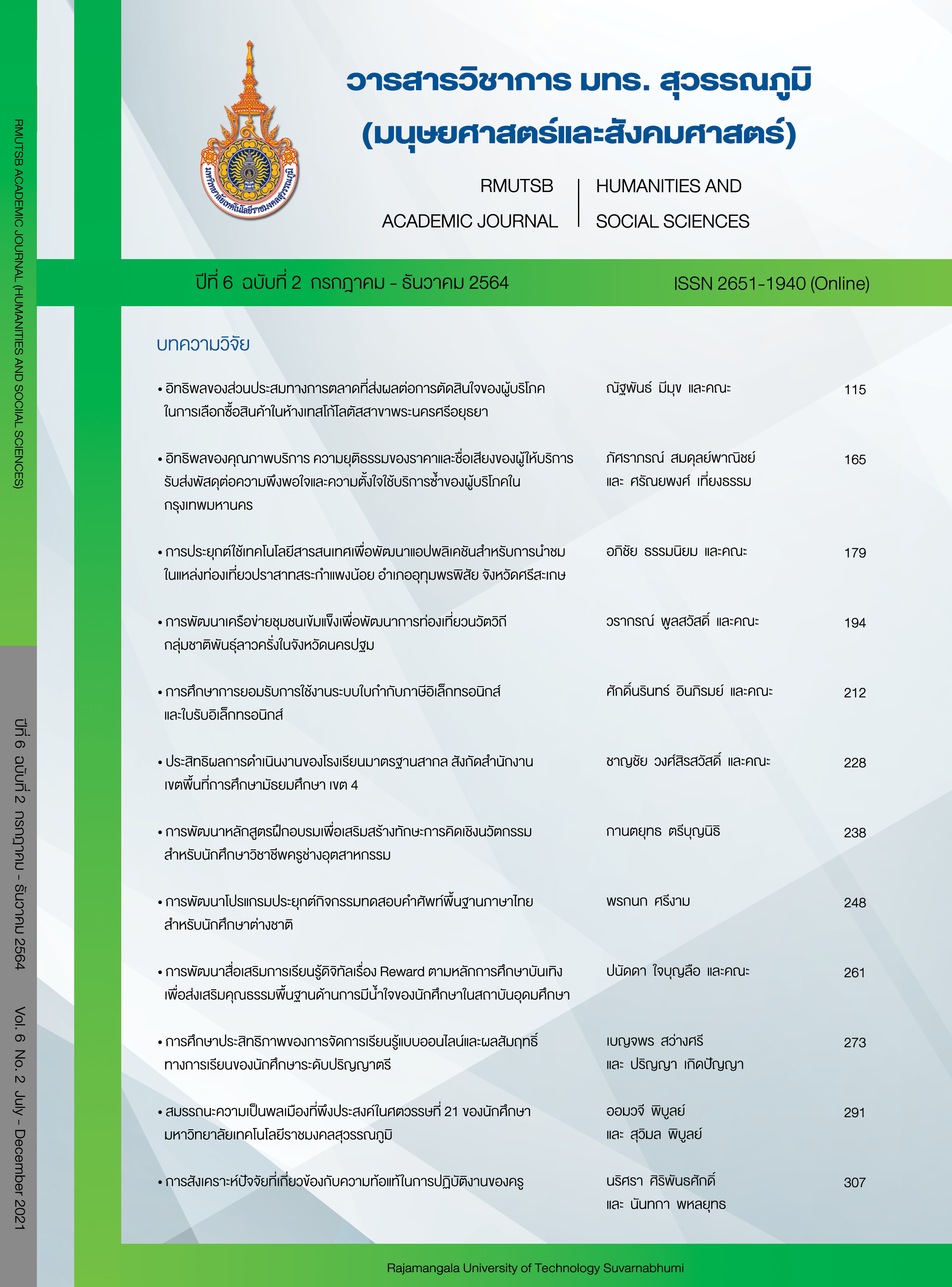A study on the acceptance of the use of e-tax invoice and e-receipt systems
Main Article Content
Abstract
The objectives of this research were to study the overall system of e-Tax Invoice and e-Receipt and to study the factors affecting the acceptance of the use of e-Tax Invoice and e-Receipt. This research is the quantitative research. The data was gathered by in-dept interview method. In order to express independent opinions, the 15 key informant samples were interviewed by nine in-depth open-ended with semi-structure questions. The research results found that very few VAT registrants used the systems due to high cost, complicated systems, operators lack of knowledge of the system and unaware of the benefits of using the system, and lack of publicity. Furthermore, there were not many service providers who deliver information related to the e-Tax Invoice and e-Receipt to the Revenue Department. The factors affecting acceptance of the use of e-tax invoice and e-receipt systems are: performance expectancy factors, effort expectancy factors, social influence factors, facilitating condition factors, attitude factors, security factors, perceived risk factors, trust factors, tax knowledge factors, tax moral factors, worthiness of investment factors, and government policy expectancy factors.
Article Details
References
Alibraheem, M. H., & Jabbar, H. A. (2016). Electronic tax filing adoption and its impact on tax employees performance in Jordan: A proposed framework. World Applied Science Journal, 34(3), 393-399.
Alshira’h, A. F., Abdul-Jabbar, H., & Samsudin, R. S. (2019). The effect of tax moral on sales tax compliance among Jordanian SMEs. International Journal of Academic Research in Accounting, Finance and Management Sciences, Human Resource Management Academic Research Society, 9(1), 30-41.
Bhuasiri, W., Zo, H., Lee, H., & Ciganek, A. P. (2016). User acceptance of e-government services: Examining an e tax filling and payment system in Thailand. Information Technology for Development, 22(4), 672-695.
Gupta, K. P., Singh, S., & Bhaskar, P. (2016). Citizen adoption of e-government: a literature review and conceptual framework. Electronic Government, An International Journal, 12(2), 160-185.
Ji, H., & Liang, Y. (2016). Exploring the determinants affecting e-government cloud adoption in China. International Journal of Business and Management, 11(4), 81-90.
Joungtrakul, J. (2010). Qualitative research: a tool for knowledge creation for national development. Bangkok: Business Law Center International. (in Thai)
Khianthongkul, K., Senasu, W., & Kamudhamas, J. (2021). Digital economy policy in Thailand: Institutional analysis on intergovernmental relations of the governmental agencies. Parichart Journal Thaksin University, 34(1), 192-205.
Lagzian, M., & Naderi, N. (2015). An empirical study of the factor affecting customers’ acceptance intention of e-invoice services: The case of mashhad electricity distribution Ccmpany. EGOSE’15: Proceedings of the 2015 2nd International Conference on Electronic Governance and Open Society: Challenges in Eurasia (pp. 97-103). St. Petersburg: Itmo University.
Lian, J. W. (2015). Critical factor for cloud based e-invoice service adoption in Taiwan: An empirical study. International Journal of Information Management, 35, 98-108.
Mandola, V. (2013). Factors influencing the adoption and use of integrated tax management system by medium and small taxpayers in Nairobi central business district, Kenya (Master’s thesis). University of Nairobi.
Mellouli, M., Bentahar, O., & Bidan, M. (2016). Trust and e-government acceptance: The case of Tunisian on-line tax filing. The Electronic Journal Information Systems Evaluation, 19(3), 197-212.
National e-Payment Working Group Project. (2017). Frequently asked questions. Question-answer the tax system. Retrieved October 18, 2018, from http://www.epayment.go.th/home/app/faq_etax (in Thai)
Nelloh, L., Handayani, S., Slamet, M., & Santoso, A. (2019). Travel experience on travel satisfaction and loyalty of BRT public transportation. The Asian Journal of Technology Management (AJTM), 12(1), 15-30.
Oladipupo, A., & Obazee, U. (2016). Tax knowledge, penalties and tax compliance in small and medium scale enterprises in Nigeria. iBusiness, 8, 1-9.
Patton, M. Q. (1990). Qualitative evaluation and research methods (2nd ed.). California: Sage.
Phumdontree, C. (2016). Factors affecting to consumer confidence in promptpay fund transfer service in the Bangkok metropolitant area (Master’s thesis). Thammasat University. (in Thai)
Poudel, R. L. (2017). Tax knowledge among university teachers in Pokhara. The Journal of Nepalese Bussiness Studies, 10(1). 69-77.
Purnamasari, D., & Sudaryo, Y. (2018). The effect of knowledge taxpayer, moral taypayer and tax sanctions on taxpayers compulsory. International Journal of Trade, Economics and Finance, 9(5), 214-219.
Rahi, S., Ghami, M. A., & Ngah, A. H. (2018). A structural equation model for evaluating user’s intention to adopt internet banking and intention to recommend technology. Growing Science, 4(4), 139-152.
Rana, N. P., Dwivedi, Y. K., Lal, B., Williams, M. D., & Clement, M. (2017). Citizens’ adoption of an electronic government system: towards a unified view. Information Systems Frontier, 19, 549-568.
Razak, F. Z. B. A. (2017). How perceived effort expectancy and social influence affects the continuance of intention to use e-government. A Study of a Malaysian government service. Electronic Government, An International Journal, 13(1), 69-80.
Redae, R. B., & Sekhon, S. (2017). Taxpayers’ moral and compliance behavior in Ethiopia: A study of Tigray state. International Journal of Research in Finance and Marketing (IJRFM), 7(4), 109-123.
Rehman, M., & Esichaikul, V. (2012). Factor influencing e-government adoption in Pakistan. Tranforming Government: People, Process and Policy, 6(3), 258-282.
Siswanto, T., Shofiati, R., & Hartini, H. (2018). Acceptance and utilization of technology (UTAUT) as a method of technology acceptance model of mitigation disaster website. IOP Conference Series: Earth and Environmental Science, 106, 012011.
Tarabay, R., & Eigbire, R. (2009). To invest or not to invest? Factors affecting IT investment decisions (Bachelor’s thesis) (JBIC18). Jönköping University, Jönköping, Sweden.
Urbina, A. U., & Abe, N. (2017). Citizen-centric perspective on the adoption of e-government in the Philippines. Electronic Journal of e-Government, 15(2), 63-83.
Yusup, M., Hardiyana, A., & Sidharta, I. (2015). User acceptance model on e-billing adoption: A study of tax payment by government agencies. Asia Pacific Journal of Multidisciplinary Research, 3(4), 150-157.
Zahid, H., & Din, B. H. (2019). Determinants of intention to adopt e-government services in Pakistan: An imperative for sustainable development. Resources, 8(128), 1-25.


